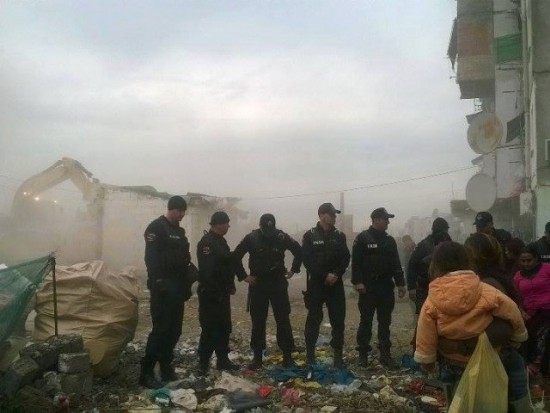US Rights Report Highlights Corruption in Balkans
The US State Department’s annual report on human rights worldwide, presented on Wednesday, described corruption as an endemic problem all over the Balkans.
Police stand guard as construction inspectoriate demolishes the houses of Roma community to clear the way for new ring road in Tirana on February 2016 | Photo: Suzana Kurtallari.
The US State Department 2015 Country Reports on Human Rights Practices – presented to Congress on Wednesday – highlighted corruption, the rule of law and discrimination as the main problems in the Balkans. “In the arena of human rights, every government has the ability to improve,” Secretary of State John Kerry said, presenting the report. “These are universal standards of human rights that have been adopted and accepted and are agreed to by most nations in the world,” Kerry said.
In its report on Albania, the US government said that “the most significant human rights problems were pervasive corruption in all branches of government… domestic violence and discrimination against women”.
Government corruption “remained among the most serious problems” in Bosnia and Herzegovina as well, the report reads, noting that “some political leaders manipulated deep-seated ethnic divisions, weakening democracy and governance.”
In Bulgaria, the US said the most pressing human rights problem was “the marginalisation of and social intolerance towards the Romani minority“, noting also “the deterioration of the media environment” and the fact that corruption represents “a drag on the government’s capabilities.”
In Croatia, discrimination and instances of violence directed against members of ethnic minorities were also the most important human rights problems, the US noted, especially towards “ethnic Serbs and Roma, and women.” The report also condemned “anti-Semitism and isolated public displays of profascist sentiments“.
In Kosovo, the US said human rights problems included “the obstruction, at times violent, of the parliament by opposition deputies … which blocked free debate and the passage of legislation”. The report also noted “endemic corruption” and the “lack of punishment for corrupt acts.”
“High levels of corruption” are the most significant rights problem in Macedonia, the US report noted, adding that the government “is failing to respect … the rule of law, including by continuing efforts to restrict media freedom, interfere in the judiciary and selectively prosecute offenders”.
In Montenegro, the report reads, “corruption was among the country’s most pressing human rights problems“, noting that it was “pervasive in health care, education, and multiple branches of government”.
According to the US, Montenegro also suffered in 2015 “from a continued deterioration of the environment for the media and civil society”, and from “discrimination and societal violence against minorities.”
In Romania, human rights problems included “police and gendarme mistreatment, and harassment of detainees and Roma”, the report reads, pointing at “government corruption” and “systematic societal discrimination against Roma” as two of the major issues that Romania faces.
Discrimination and societal violence against members of minority groups, especially Roma, were the most serious human rights problems also in Serbia, the report noted.
According to the US, “harassment of journalists and pressure on them” was also a significant problem, as well as corruption and an inefficient judicial system, which has caused “lengthy and delayed trials”.
14 April 2016

